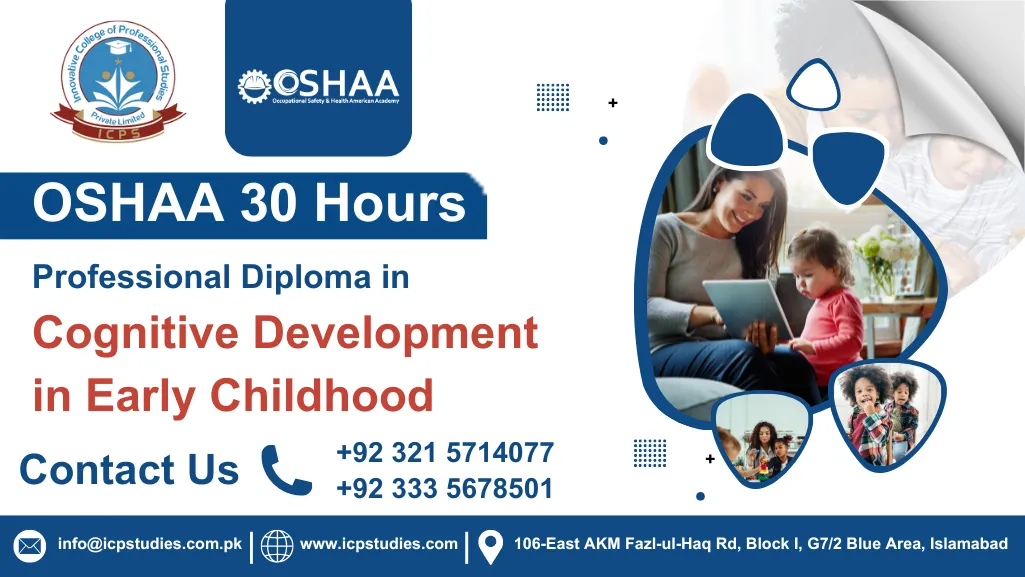Early childhood is a critical period for cognitive growth, shaping the foundation for lifelong learning and development. Recognising the importance of this formative stage, the OSHAA 30-Hours Professional Diploma in Cognitive Development in Early Childhood provides educators and childcare professionals with specialised knowledge and practical skills to support young children’s cognitive abilities effectively.
Cognitive development refers to the progression of thinking, problem-solving, memory, and language skills that children acquire from birth through early childhood. This development influences how children understand and interact with their environment, forming the basis for academic success and social competence.
The OSHAA diploma focuses on equipping professionals with a deep understanding of these processes and the strategies to foster an enriching learning environment tailored to the needs of young learners.
The OSHAA 30-Hours Professional Diploma in Cognitive Development in Early Childhood is an invaluable qualification for anyone dedicated to nurturing young minds. By deepening your understanding of cognitive processes and applying evidence-based strategies, you can make a significant impact on children’s early learning journeys and future success.
All About OSHAA 30-Hours Professional Diploma in Cognitive Development in Early Childhood
Course Overview
The OSHAA 30-Hours Professional Diploma in Cognitive Development in Early Childhood offers specialised training for educators and childcare professionals focused on the critical early years of a child’s cognitive growth. This comprehensive course covers key theories, developmental stages, and practical strategies to support thinking, problem-solving, language, and memory skills in children aged 0 to 8 years.
Participants will learn how to create stimulating learning environments that encourage exploration and play, essential for effective cognitive development. The diploma also emphasises the importance of understanding cultural and family influences on children’s learning, equipping professionals to tailor their approaches to diverse needs.
Designed with flexibility in mind, the course combines theoretical knowledge with practical application through interactive sessions and case studies. Upon completion, learners will be well-prepared to foster early childhood cognitive skills and contribute meaningfully to educational settings.
Study Units
- Introduction to Cognitive Development in Early Childhood (3 hours)
- Stages of Cognitive Development in Young Children (4 hours)
- Factors Influencing Cognitive Development (4 hours)
- The Role of Play in Cognitive Development (4 hours)
- Language Development and Cognitive Skills (4 hours)
- Memory, Attention, and Problem-Solving in Young Children (5 hours)
- Promoting Cognitive Skills Through Classroom Activities (3 hours)
- Supporting Children with Cognitive Delays or Learning Disabilities (3 hours)
Minimum Age:
- Candidates must be at least 18 years old to enrol in this course.
Educational Background:
- A minimum of a high school diploma or equivalent is recommended.
- Background in education, childcare, or related fields is advantageous but not mandatory.
Work Experience:
- Prior experience working with young children or in early childhood education settings is preferred but not essential.
- Individuals new to the field are welcome to join, provided they have a genuine interest in child development.
Language Proficiency:
Non-native speakers should demonstrate an intermediate level of English, equivalent to IELTS 5.5 or above, to fully benefit from the course.
Proficiency in English is required as all course materials and assessments are delivered in English.
Early childhood educators and teachers seeking to deepen their understanding of cognitive development.
Childcare practitioners working in nurseries, preschools, and early learning centres.
Education consultants and curriculum developers focused on early years learning.
Parents and guardians interested in supporting their child’s cognitive growth.
Professionals aiming to build a career in early childhood education and development.
Social workers and child development specialists looking to enhance their knowledge.
Anyone passionate about nurturing young children’s learning and development.
Learning Outcomes
Introduction to Cognitive Development in Early Childhood
- Understand the basic concepts and significance of cognitive development in early childhood
- Recognise how cognitive development impacts overall child growth and learning
Stages of Cognitive Development in Young Children
- Identify and describe the key stages of cognitive development from birth to early childhood
- Understand developmental milestones and typical behaviours at each stage
Factors Influencing Cognitive Development
- Recognise the various biological, environmental, and social factors affecting cognitive growth
- Analyse how family, culture, and nutrition contribute to cognitive development
The Role of Play in Cognitive Development
- Understand the importance of play as a learning tool for cognitive skills
- Learn different types of play and how they support thinking and problem-solving abilities
Language Development and Cognitive Skills
- Comprehend the relationship between language acquisition and cognitive development
- Identify strategies to support language growth in young children
Memory, Attention, and Problem-Solving in Young Children
- Understand the development of memory, attention span, and problem-solving skills
- Learn techniques to enhance these cognitive functions through early education
Promoting Cognitive Skills Through Classroom Activities
- Design and implement age-appropriate activities that foster cognitive development
- Evaluate the effectiveness of classroom strategies in supporting cognitive growth
Supporting Children with Cognitive Delays or Learning Disabilities
- Identify common cognitive delays and learning disabilities in early childhood
- Develop inclusive approaches to support and accommodate diverse learning needs
If you want me to make it more detailed or simplified, just let me know!
FAQs OSHAA 30-Hours Professional Diploma in Cognitive Development in Early Childhood







